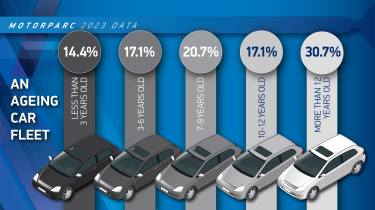
There’s been a small 2.1 per cent decrease in the CO2 emissions of ‘the average’ UK car, even though it’s now more than a year older than the average car was in 2019.
According to latest analysis of the UK ‘car parc’ by the Society of Motor Manufacturers and Traders (SMMT), the number of vehicles on the road rose to a record 41.4 million last year, with car ownership rising by 1.6 per cent and privately owned cars accounting for the vast majority – 35,694,845 to be exact – of the vehicle total.
Rises in the cost of motoring and the cost of living generally, combined with two years of production delays, have delayed the rate at which cars are being replaced, and the net result is an ageing population of cars on our roads. According to the SMMT, while the car business has recovered from its post-Covid supply challenges, the implied scrappage rates for older cars have also fallen to the lowest recorded levels, hence the rise in average age from less than eight years in 2019 to over nine years now.
Still, the recent influx of low emissions electric cars and hybrids to corporate vehicle fleets means the average CO2 output of UK cars – at least as far as official WLTP figures are to be believed – has fallen by a couple of percentage points. That means overall, the national car fleet is ageing faster than it’s cleaning up.

In the light of the latest data, the SMMT has renewed its calls for an acceleration of investment in EV charging infrastructure – there’s currently just one standard public chargepoint for every 35 plug-in vehicles on the road, a ratio which shows no meaningful improvement since the previous year.




